Tom Daley, Britain’s most decorated diver, grew up in the spotlight. He was 14 when he made a splash at his first Olympics, in 2008, and at 15 he became a world champion. This year in Tokyo, at his fourth Games, he finally won a longed-for gold, with his synchronised diving partner, Matty Lee. In 2013, Daley came out – a rarity among professional sportspeople – and he has become a campaigner for LGBTQ+ rights. Now 27, he is married to the screenwriter Dustin Lance Black, with whom he has a three-year-old son.
In a new autobiography, he describes struggles with injury, debilitating anxiety and coping with the death of his father, his biggest champion. Here, one of Britain’s best-loved athletes gamely answers questions from our writer and Guardian readers on all of the above, as well as his other great passion: knitting.
Which do you think has had a greater role in your success – hard work, luck or talent? (Sam, UK)
I think it’s work, talent and luck, if I was to put them in order. It’s a lot about hard work, having the right mindset and being able to nurture what nature has given you.
What was your mindset when it came to each of your four Olympics? (Margaret, Canada)
In 2008, I didn’t have many expectations; I just wanted to give it my best shot. In 2012, it was about the experience and the home crowd. There was a performance goal, but I also knew that I had more Olympics in me. Going into 2016, it felt like my best chance – I was in the best possible shape. I put unbearable pressure on myself [Daley won bronze with Dan Goodfellow in the synchronised 10-metre, but didn’t make the final in the individual event]. When I went to 2020, my perspective shifted and the most important thing for me was my family – knowing they love me and support me, regardless of how I do.
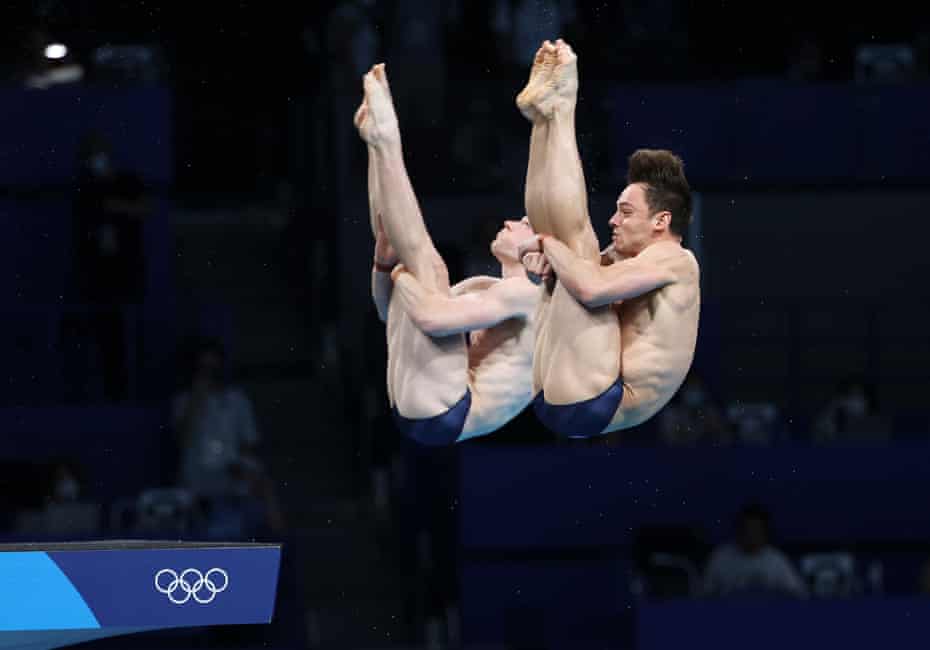
How do you stay motivated for so many years? What techniques do you use to get into the zone on competition day? (Meena, US)
I try to do 10 minutes’ meditation every day, whether that be breathing work, guided meditation or knitting or crochet. The elusive Olympic gold medal was what was keeping me going, but there’s always something to motivate me. It’s difficult some days, like it is for everyone, but I want to set a good example to [my son] Robbie of working hard, that you don’t just get given things and that your best is OK.
My dad said: “If you go into a competition with 18 people in it and you come last, as long as you do your best, you’re 18th-best in the whole country. How cool is that?” I want to be able to pass that on to Robbie – it’s not about which medal you win, it’s about the attitude you have.
What does a bad day look like for you? How do you stay optimistic? (Kerish, the Philippines)
I need a lot of sleep and I like to eat, so if there’s no food in the house then I will definitely be slightly cranky. Working out, or just going for a walk, turns my mood around. Knitting can also help, or doing something with Robbie.
On a bad training day, I used to spiral, but my coach told me to be like Peter Pan and fly out of it. One bad day is a day in a week, in a month, in a year, in a whole career of things that have also gone really well. I try to acknowledge it and then move on. In a competition, each dive is an independent event. You just have to be in the moment.
Have you ever dived from a board higher than 10 metres? (Adam, UK)
Absolutely not. Going up to those 27-metre boards is terrifying. I went up there in Barcelona after the 2013 world championships and it was so high. I was like: how does somebody even jump off this? But it’s extremely exciting to watch.
You had BBC Sports Personality of the Year sewn up until the US Open. As a former teenage sports star, what is your message for Emma Raducanu as she begins her life in the spotlight? (Allan, UK)
Stay true to who you are and keep working hard. Don’t get distracted by anything and keep striving towards your goals.
What are your views on the sexualisation of athletes in sport, having been pushed as a poster boy and not wearing very much? (Milly, UK)
You have these body issues as an athlete. Lots of people would look at athletes and be like: “What are you talking about? You’re an athlete, you’re in shape, you have nothing to worry about.” But especially as a diver, you’re up on the diving board and you’re so naked, so visible, so it’s quite hard to be content with your body, because you always want to be better.
You wrote about this in your book. Is it fair to say you developed an eating disorder? Would you call it that? (Emine Saner)
I used to make myself throw up, in 2012. I weigh myself every day. I’ve had a very strange relationship with food and my body image. I guess it is a mild form of that. Men always seem to not have eating disorders, and it’s hard to talk about it. But I would consider myself to be someone that has very much struggled with body image, and eating, and feeling guilty and shameful of the things that I eat.
You also wrote that some of the magazine shoots you did when you were young perhaps wouldn’t be appropriate now. (ES)
I don’t know if there would be shoots of maybe 14-, 15-, 16-year-old boys in their trunks, with water thrown all over them, now. I know there definitely wouldn’t be girls doing that. It’s hard to say what’s right and what’s wrong. Looking back, it made me feel more mature; I never felt taken advantage of in any way. I don’t think the body image issues come from anything to do with the media. My body image [issues] came from within my sport – it was hammered into me that I was overweight and needed to lose weight in order to perform.
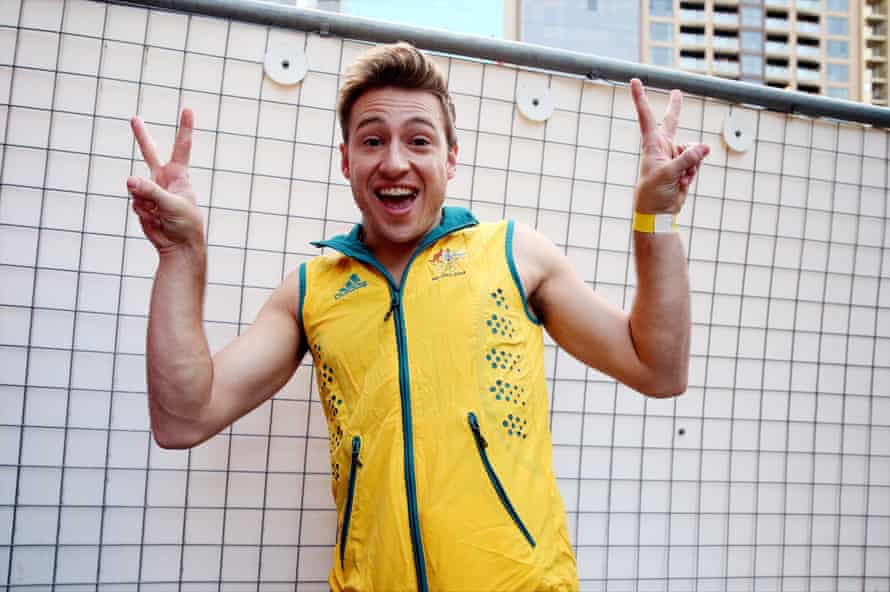
You have talked about the importance to young people of having LGBTQ+ sporting role models. What effect did it have on you when the Australian diver Matthew Mitcham came out in 2008, before winning gold in Beijing? (Kathryn, UK)
He’s been a massive source of inspiration – he was the first openly gay man to win an Olympic gold medal. He lives in London and we hang out quite often. Being able to have role models is so important; seeing someone like you do well does help motivate you and make you think: “I can do that, too.”
What was life like before and after coming out? (Ian, Singapore)
I had to figure out my sexuality very much in the public eye. For me, coming out lifted a weight off my shoulders. It eats you up inside when you’re trying to be someone you’re not, or not even trying to be someone you’re not, but not necessarily being honest. It was terrifying, but at the same time it was like: now I no longer have to hide. It was very much wanting to take control of the situation.
You and Lance are vocal about LGBT rights in the UK, the US and the Commonwealth. If you could bring one issue before any politician of your choice, what would it be? (Dorothea, Germany)
In terms of sport, I think no country should be able to host any kind of international event unless they have equal rights for LGBT people, for women, for people of colour. There should be a standard, where anyone that wants to go there is going to be safe, supported and not feel threatened for their life. The 2022 football World Cup is in Qatar – for women and queer people, that can be a dangerous place. After I came out, I didn’t go to Russia [which has homophobic laws] to compete, because I was worried, and then [for the next competition there] I was like: “You know what? I want to go, to be visible.” That, I think, is more powerful than not going at all. As an athlete, I’m in a safer position, but for people just living their lives in many countries, it’s a scary place to be.
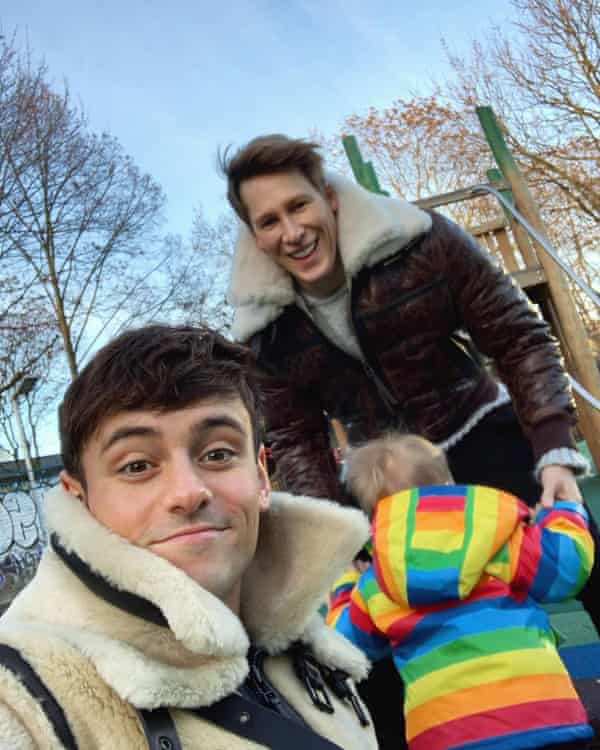
How did you meet Lance? (Stefanos, Germany)
At dinner in Los Angeles, in March 2013. Our mutual friend brought some friends, of which Lance was one. In that first week, we said we loved each other and we named our children. And here we are, four years married and with a three-year-old son.
Do you sometimes feel the 20-year age gap between you? (Evgeniya, Russia)
Never. If anything, Lance is very much the big kid in the house. I consider myself to be an older soul, hence I have nearly 200 houseplants, and I knit, and I like to be able to have conversations with people who have experienced a similar amount as I have. That’s where Lance and I connected a lot – he had lost his brother, I’d lost my dad, and then he lost his mum. We’d also experienced the highs of a career [Black won an Oscar in 2009 for his screenplay for Milk] and having that comedown afterwards. That was something we really were able to connect on.
Do you have any plans for new additions to the family? (Cindy, Myanmar)
It’s not quite as easy as a bottle of wine and a good time. A lot of thought has to go into it, but absolutely, I’d love more kids.
How difficult was it for you to remain focused on diving during your dad’s illness and death? [Daley’s father, Robert, died in 2011 from a brain tumour.] (Cliff, Mexico)
I didn’t allow myself to believe that it was going on, and diving was my outlet to escape from it all. Even after my dad died, I was very much “diving, diving, diving”. It wasn’t until I met Lance and he said: “You need to deal with this, you can’t just carry on and pretend that nothing’s happened.” Now I’m able to share memories, do some of the things we used to do together, rather than be like: “I can’t do this, it makes me too sad.” It was extremely tough at the time, all very public, and I felt like I had to be strong for my family. Everybody grieves differently, but I definitely had a delayed grief moment.
I was so moved to read in your book that your dad’s ashes are buried by the diving board at the London Aquatic Centre. (ES)
It was one of those things that only I knew during London 2012. That’s why I put my water bottle there; I still put my bottle there whenever I train. He got the best seat in the house – no parents are allowed poolside during diving competitions, let alone the Olympics. It was very special to me that I won my first Olympic medal in that pool.
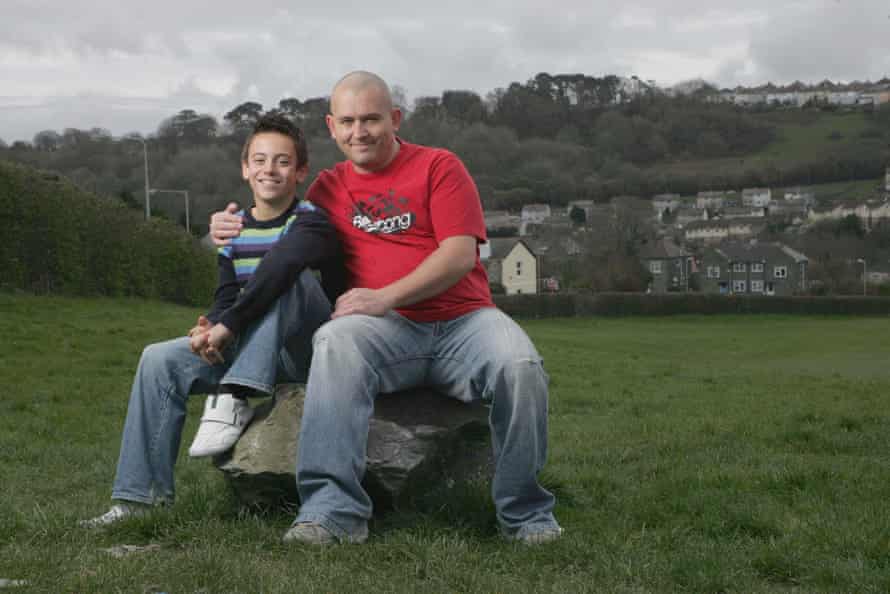
The diving facilities at my local pool closed and a new leisure centre was built without one. There is no chance that my children will take up diving. What can be done to make diving accessible to the next generation of Olympians? (Richard, UK)
There are more 10-metre diving facilities than ever before in the UK, but lots of smaller facilities are being closed. I started the Tom Daley Diving Academy, which is now across pools without diving boards, teaching people the basics off the side. You can get a feel for diving and then if someone is good and is talent-scouted, they can move to diving pools. I’d like to see more leisure centres that have, not even 10-metre facilities, but if you can have 1-metre, 3-metre and 5-metre boards, that is great for beginners.
How did you keep up training during lockdown? (Sarah, UK)
I was doing somersaults on to sofa cushions. I had a spin bike, a treadmill; I would occasionally go for runs, do Zoom workouts. I ordered things to be delivered, like weights, but they took for ever because everybody wanted them. It allowed me to focus on things I never would usually, like time to stretch and all those things that really help.
How often do you and Matty Lee speak? And have either of you decided on 2024? (Curtis, US)
Matty is actually living in my house [in London] while I’m in Calgary [where Black is making a TV show]. He was meant to be out by the time I get back, but I’m going to be living with him for a month. We speak all the time. An individual gold would have been amazing, but there’s almost something more special about the synchro, because you get to share that moment with someone.
No decisions have been made about 2024. If I’d won a gold medal in 2016, I planned to retire, because I didn’t think, as an older athlete, I was ever going to be as good. I’m still very much on an upward trajectory.
What got you into knitting? (Matilda, UK)
My coach always wanted me to sit down, rest, recover. Because I’m one of those people always up doing something, Lance said some people on [TV sets], while they’re waiting between takes, will knit. I was terrible at it, got a bit of info from YouTube and a couple of divers on the international scene helped me, and then all of a sudden I was obsessed with it. Every new project was a new technique to learn. It’s what I do whenever I have a moment. I used to be a massive nail biter and now I don’t bite my nails, because that fidgeting is gone.
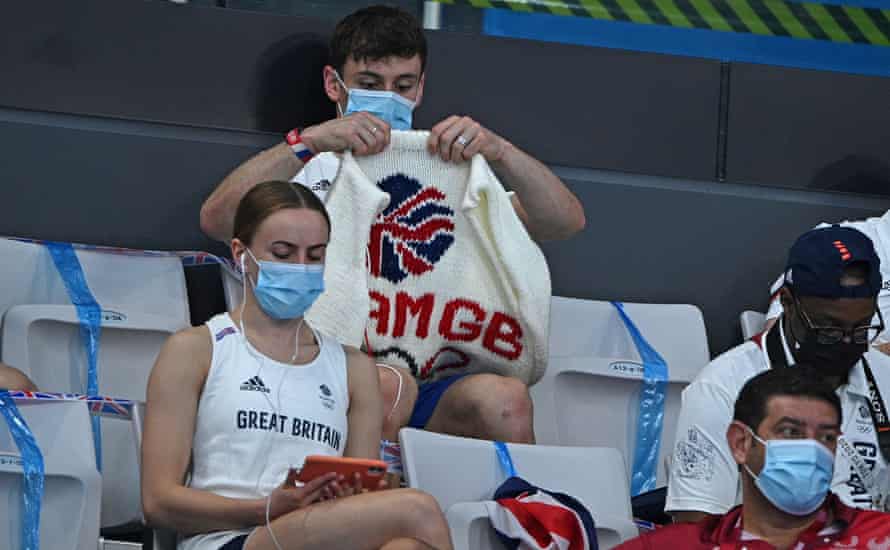
If you had to give an athlete one of your knits, what would it be? (Lauriane, France)
Maybe I’ll knit Usain Bolt a full running leotard – green, gold and black. It might be a bit heavy, though.
Will you be competing in next year’s Commonwealth Games in Birmingham? (Roseanne, UK)
I want to take a longer break and I think, by the time I get back to training, I will have missed the qualification event. Unless our director says: “We know you can do it, so you’re qualified already,” but, otherwise, probably not.
Which other Olympic sports would you most and least like to compete in? (Susan, UK)
Something I’d already have some ability in would be gymnastics, but I’d love to do luge or skeleton, or bobsleigh. Least appealing? Swimming. Watching it is fine, but the training – swimming up and down, looking at a black line on the bottom of the pool – is not appealing to me.
Do you plan to turn your knitting hobby into a business? (Netasha, Malaysia)
I’d love to work out a way of getting more people into knitting, just for the mindfulness element – and to be able to make your own clothes would be better than all the fast fashion.
Where do you see yourself in five years? (Alexandra, Canada)
I’d love to have a successful knitwear business and be established as a TV host. And maybe with more children.
In the UK, the eating disorder charity Beat can be contacted on 0808 801 0677. In the US, the National Eating Disorders Association is on 800-931-2237. In Australia, the Butterfly Foundation is on 1800 33 4673. Other international helplines can be found at Eating Disorder Hope
Coming Up for Air by Tom Daley is published on 14 October (HQ, £20) in hardback, ebook and audiobook. To support the Guardian and the Observer, order your copy at guardianbookshop.com. Delivery charges may apply






More Stories
Discovering 6 Luxurious Hotels in Spain and Portugal
Sports for the soul: How being active improves your mental health
Teams debate the power of sport at the Commonwealth Secretariat